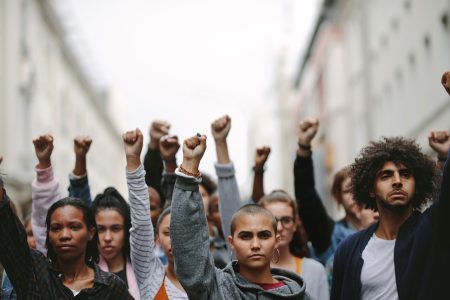Widgetized Section
Go to Admin » Appearance » Widgets » and move Gabfire Widget: Social into that MastheadOverlay zone
The Broader Context of DEI Programs: Political Influence, Privilege and Power Dynamics
The views expressed are those of the author and do not necessarily reflect the views of ASPA as an organization.
By Derrick Phillips
January 31, 2025

Diversity, Equity and Inclusion (DEI) programs have become a focal point in conversations about workplace culture and systemic inequities. Rooted in creating fair and inclusive environments, these initiatives aim to address historical injustices and empower marginalized groups. However, the implementation and reception of DEI programs are profoundly influenced by political ideologies, privilege and power dynamics, leading to significant progress and substantial pushback.
The Role of DEI Programs in Addressing Inequities
DEI programs are designed to identify and mitigate disparities in opportunities, representation and outcomes within organizations and society. Focusing on structural barriers and unconscious biases, these initiatives seek to foster environments where people from diverse backgrounds can thrive. Central to this mission is recognizing the power dynamics that have historically marginalized certain groups while privileging others.
For example, DEI programs often address systemic issues like unequal access to leadership roles, wage gaps and workplace discrimination. These initiatives encourage organizations to promote inclusivity by hiring diverse talent, supporting equitable pay structures and implementing anti-bias training.
Privilege and Power Dynamics in DEI
Privilege is pivotal in shaping how individuals and organizations engage with DEI efforts. In this context, privilege refers to unearned advantages granted to specific groups based on race, gender or socioeconomic status. For instance, white privilege—a term that describes the societal benefits often afforded to white individuals—remains a critical concept in discussions about equity and inclusion.
Understanding privilege is essential for addressing disparities. However, these conversations can be polarizing as they challenge entrenched power structures. Discussions of privilege are often met with resistance from those who feel implicated or defensive about their advantages. This dynamic complicates DEI initiatives, as organizations must navigate deeply personal and often contentious conversations.
The Political Backlash Against DEI Programs
In recent years, DEI programs have been scrutinized, particularly by conservative politicians and commentators. Critics often frame these initiatives as divisive or promoting a political agenda, arguing that they undermine merit-based systems or impose unnecessary costs on organizations. Some states have introduced legislation restricting the implementation of DEI training in public institutions, citing concerns about indoctrination or ideological bias.
This backlash reflects broader political polarization, where issues of race, identity and systemic inequities are hotly debated. For some, DEI programs symbolize progress and accountability; for others, they are seen as a threat to traditional power structures or as an imposition of “woke” ideology.
The political influence on DEI is also evident in funding decisions, public discourse and organizational priorities. For instance, legislative efforts to defund DEI initiatives in universities or public agencies have had a chilling effect, forcing some institutions to scale back their efforts or rebrand their programs to avoid controversy.
The Implications of Dismantling DEI Programs
The dismantling or scaling back of DEI programs can have far-reaching consequences. Without intentional efforts to address inequities, organizations risk perpetuating systemic barriers that disproportionately affect underrepresented groups. The absence of DEI initiatives can lead to:
- Decreased Representation: Without intentional recruitment and retention strategies, marginalized groups may remain underrepresented in leadership roles or decision-making positions.
- Erosion of Trust: Employees and stakeholders who value equity and inclusion may perceive organizations as unresponsive or regressive, leading to decreased morale and engagement.
- Missed Opportunities: Research consistently shows that diverse teams perform better and drive innovation. Organizations that fail to prioritize diversity may fall behind in competitiveness and creativity.
Charting a Path Forward
While the future of DEI programs faces uncertainty in some contexts, there are ways to navigate the challenges posed by political influence and power dynamics:
- Focus on Universal Values: Framing DEI efforts around shared values such as fairness, respect, and opportunity can help bridge ideological divides. Emphasizing the business case for diversity—such as improved performance and innovation—can garner broader support.
- Strengthen Leadership Commitment: Leaders must demonstrate unwavering commitment to equity and inclusion, even in the face of political or cultural pushback. Transparent communication and consistent action are key to maintaining momentum.
- Engage in Difficult Conversations: Addressing privilege and power dynamics requires open, respectful dialogue. Facilitating these conversations to promote understanding rather than division is critical.
- Adapt and Evolve: DEI programs must remain flexible and responsive as political and social landscapes shift. This includes finding creative ways to sustain efforts even in environments hostile to overtly DEI-focused language or initiatives.
Conclusion
DEI programs represent a crucial step toward creating a more equitable society, but their success depends on navigating the complex interplay of privilege, power and politics. While conservative pushback has challenged these efforts, it has also underscored the importance of sustained advocacy and intentionality.
Ultimately, the effectiveness of DEI programs hinges on their ability to address systemic inequities while fostering unity and collaboration. By remaining steadfast in their mission and adaptable in their approach, organizations can continue to champion diversity, equity and inclusion—even in the face of resistance.
Disclaimer
The opinions expressed in this article are my own and are not the official position of my agency.
Author: Derrick Phillips is a 30-year St. Louis Fire Department veteran, serving as Operations Chief for the A-Shift, Executive Officer, and the Office of Homeland Security Commander. He holds a Master of Arts in Security Studies from the Center for Homeland Defense & Security at the Naval Postgraduate School and a Master of Public Administration from Arkansas State University. Chief Phillips also holds the Chief Fire Officer designation through the Center for Public Safety Excellence and is a graduate of the IAFC Fire Service Executive Development Institute.


Follow Us!